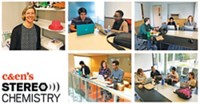Advertisement
Grab your lab coat. Let's get started
Welcome!
Welcome!
Create an account below to get 6 C&EN articles per month, receive newsletters and more - all free.
It seems this is your first time logging in online. Please enter the following information to continue.
As an ACS member you automatically get access to this site. All we need is few more details to create your reading experience.
Not you? Sign in with a different account.
Not you? Sign in with a different account.
ERROR 1
ERROR 1
ERROR 2
ERROR 2
ERROR 2
ERROR 2
ERROR 2
Password and Confirm password must match.
If you have an ACS member number, please enter it here so we can link this account to your membership. (optional)
ERROR 2
ACS values your privacy. By submitting your information, you are gaining access to C&EN and subscribing to our weekly newsletter. We use the information you provide to make your reading experience better, and we will never sell your data to third party members.
Careers
The Human Side Of Chemistry
by Rudy Baum
October 22, 2007
| A version of this story appeared in
Volume 85, Issue 43
HOW ABOUT THAT Nobel Peace Prize going to the United Nations Intergovernmental Panel on Climate Change and former vice president Al Gore? Imagine, a large group of distinguished, if oft-maligned, scientists and an articulate and passionate politician honored for their efforts to document and inform the world about a global issue with scientific and public policy implications. What will those Norwegians think of next?
WHILE EVERY ISSUE of C&EN brings its readers a broad range of stories on the chemical enterprise, some issues—like this one—stand out. The issue is packed with stories on developments in the chemical industry, important public policy issues, a ton of fascinating chemistry, news of activities of the American Chemical Society, and an employment feature.
The issue also showcases one of C&EN's many talented young staff members, Linda Wang.
Wang joined C&EN in 2003 in the Editing & Production group. She moved to the ACS News & Special Features group two years later, where she has carved out a niche for herself that's a little hard to describe. She writes ACS News stories, of course, and a number of employment features each year. She has become an accomplished photographer. But she also has written a number of unique-to-C&EN stories on topics that are a little outside the mainstream of our traditional coverage.
This week's cover story is a case in point. "Chemistry Behind Bars" looks at a chemistry course taught to inmates at San Quentin State Prison in California. Wang observed the class at the prison in August and interviewed several of the inmates participating in it and the instructors teaching it. The resulting story is an illuminating and moving narrative about chemistry touching people's lives.
The prime mover behind the chemistry course is Chip Crawford, a fourth-year chemistry graduate student at University of California, Berkeley. Three other UC Berkeley grad students assist Crawford in teaching the class. One of them, Michael Rousseas, told Wang, "I'm not training these guys to become scientists. I'm trying to get them excited about the world through a scientific point of view."
Wang writes that "Crawford says he never asks the students about the crimes they committed. 'I want to think of my students as students,' he says. 'I'd be afraid that knowing what they did would really influence how I interact with them. I would like for them to have a place where for four hours, they're students, and that's all they are.' " Like him, Wang's article does not discuss the crimes committed by the students she interviewed.
The inmates learning chemistry are also learning new aspects of themselves. "I'm finding out that I'm a nerd, and I'm proud of it," says Rodney Scott, who does chemistry homework two to three hours a night, four nights a week.
"I think that chemists in general have a desire to make the world a better place," says Rick Branson, who is taking chemistry for the first time. "By educating people like me-inmates-you're making the world a better place, because it's changing my life."
Wang also wrote this week's employment feature, C&EN's annual survey of the best companies to work for. As different a story as "Workplaces That Work" is from "Chemistry Behind Bars," they have in common Wang's ability to get people to talk about what moves them, what they value, and why.
Wang talked to employees at DuPont, Inspire Pharmaceuticals, and Tec Laboratories, the three companies profiled in the story. "What stood out about these top picks," Wang writes, "was each company's unwavering commitment to its employees, both every day and in times of tremendous need." It may sound corny in these days of globalization and frequent job changes, but a corporate culture of commitment to employees still creates an environment where people thrive.
At C&EN, we also work to ensure an environment where our talented reporters, editors, designers, and Web specialists can thrive while creating the newsmagazine that serves your needs.
Thanks for reading.
Views expressed on this page are those of the author and not necessarily those of ACS.




Join the conversation
Contact the reporter
Submit a Letter to the Editor for publication
Engage with us on Twitter